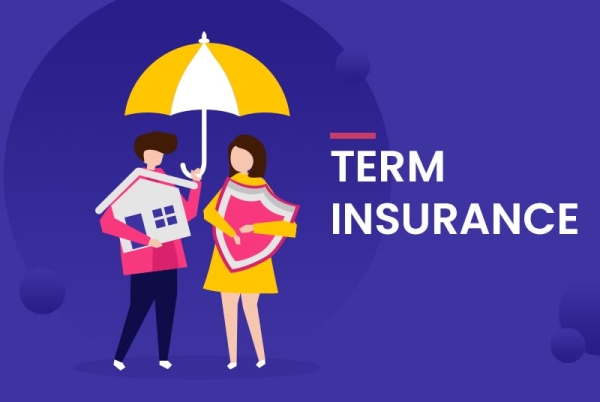Is term insurance necessary? What is the main advantage of term life insurance?
Also, many term life policies are "renewable" and "convertible." The former ensures that you can get another term policy without a medical exam at the end of th
- by Gaurav Grover 2023-07-05 07:06:04
Term Life insurance has certain advantages and some limitations when compared to other types of life insurance. Let's take a closer look at this to understand in what kind of situations you should consider buying term life insurance.

Advantages of term life insurance:
- Simplicity
Term insurance plans are much easier to understand than insurance plans, such as endowment policies, which combine risk coverage with savings. Plans that include risk coverage, as well as a savings component, are also known as cash-value plans. It is not always easy for a layperson to divide the premium he pays into risk cover cost and the amount actually invested on his behalf as savings. Planning financial goals around a cash-value insurance plan can be really challenging. There are rules governing things like the size of your cash value savings compared to the policy death benefit, policy loan repayments, and so on. On the other hand, Term life is the essence of simplicity: pay the premium and get covered for the term chosen.
- Competitive pricing
Term life policies can easily be compared to each other on the basis of price, as they are structurally similar and also easy to understand. This has led to a very competitive market in which term life policies are rapidly becoming a 'commodity'. Buyers suffer fewer information problems with term insurance, which makes the term market more price competitive than cash-value policies.
- Flexibility
It is much easier to opt out of a term life policy than get out of cash value policies. In term policies, if the premium is not paid, the risk cover ceases and the policy ends. You are not paid anything because there is no savings element in the policy. However, cash value policies only provide the full promised survival benefit if they are held for the full tenure of the policy. If you stop paying premiums in the med term, there will be a financial loss, as you cannot recoup your savings portion of the policy without certain deductions.
Also, many term life policies are "renewable" and "convertible." The former ensures that you can get another term policy without a medical exam at the end of the first term policy. The latter allows you to convert your term life insurance policy into an endowment policy for the same amount insured with an associated increase in premium if this makes sense over the life of the policy.
- Tax benefits
It is often said that if you buy an endowment type of insurance since the premium is more, you will get more benefits u/s 80C of the Income Tax Act while investing. In addition, it also generates tax-free income when the outstanding claim is paid. However, it should be noted that while the premium paid for term insurance is much lower, it is also eligible for the tax benefit u/s 80C. Moreover, the difference in premium between term insurance and endowment insurance can also be invested in some other tax-efficient schemes such as PPF and ELSS which also offer front and back tax breaks similar to those offered by an endowment plan.
- Lower premiums
The term premium is much lower than comparable cash value policies. For example, it is currently possible for a 30-year-old to buy a 20-year insurance policy for an insured amount of Rs 10 lakh for an annual premium of about Rs 3,000. For a non-profit endowment policy, with exactly the same death benefits, the premium would be just over Rs 30,000 per annum. For the winning giveaway policy, the annual premium will be around Rs 50,000.

Limitations of term insurance
- The term insurance premium increases significantly with age, and therefore the insurance needs of higher ages cannot be economically met with term insurance.
- At older ages, say after 65 or 70, it becomes difficult to buy term insurance because most companies do not offer it after these ages. Even in cases where term insurance is offered at ages beyond this, several conditions, disadvantageous to the insured, are attached.
Term insurance will not work if you want to save money for a specific need, such as children's education, marriage, old age provision, such as retirement needs, etc.
- It will also not help you provide income or capital needs of your family while you are living.
- There are no surrender values or loans available under term policies.
- Term insurance cannot provide a hedge against inflation as they are without profit plans.
- If at any time if you become uninsurable due to health or other reasons, then no new term insurance or renewal of an existing term policy will not be available.
Wealth creation is not possible through term insurance. So, after examining the benefits and limitations of term insurance, let's take a look at the situations in which it may be useful.

Uses of Term Insurance
Term insurance policies will be most appropriate for the following life situations and needs:
- If your budget is tight, term insurance is a better option, because cash-value insurance costs much more.
- Term insurance may also be suitable for someone who has a low income but requires a large coverage to protect their family's financial future in case of his demise. For similar reasons, this type of insurance is also suitable for someone who is the sole breadwinner in the family and has a moderate income.
- People on the threshold of new careers or business ventures can save costs by buying term insurance instead of a cash value policy so they can use the balance of their income or capital to build their careers or business.
- Term insurance is also suitable if you have taken a large loan, such as a home loan, car loan, etc. It is also suitable for people who have invested heavily in a new business by borrowing at high-interest rates or by mortgaging their property. These people can cover their own risk of death before paying all loans by taking cheaper term insurance than other types of insurance.
- It can be used to cover the risk of business loss due to the untimely death of key persons by cash-strapped enterprises as key man insurance at low cost. In fact, IRDA today states that term insurance coverage must be purchased for Key Man and Partnership insurance.
- It offers an inexpensive method of providing financial security for your domestic servants.
- Employers can also use term insurance to provide life coverage to their employees, particularly the labor class, as a low-cost welfare measure. In addition, companies can claim the premium paid on such policies as a business expense.
- The term insurance can be used to ensure future insurability. Someone who wants a large amount of cash value insurance may not be financially able to pay for it immediately. Inexpensive term insurance can be easily converted into cash-value insurance later when the capacity to pay improves. Generally, when a fixed-term plan is converted to an endowment plan, a medical check-up is not required at the time of conversion. However, if a person without any life insurance wants to purchase an endowment plan at an older age, a medical exam is usually required and may lead to the person being denied insurance.
- Term insurance can be a supplement to endowment and life policies in a well-rounded financial plan designed to take into account the capital and income needs of an individual. For example, term insurance can be used as a rider to a cash value insurance policy to increase death coverage for a specified period of time, for example when a loan has been taken and has to be repaid.
- Term insurance is the minimum required to provide financial security for your dependents in case of your untimely demise. It is the cheapest way to protect your future income from the risk of dying before have earned it.
Term insurance will also be beneficial for those who do not wish to save through cash value insurance policies and believe in the 'buy term and invest the difference in other avenues'. These individuals can buy term insurance for death coverage and invest their savings in other avenues (such as mutual funds, etc.) to meet their income and capital requirements while they are alive. However, such an arrangement must be carefully planned and executed in order to yield desired results.
Finally, investors need to remember that life insurance is an essential part of a good financial plan. This is because it is superior to any savings plan, as it gives out what one wanted to save rather than what one has already saved in the case death overtakes the savings plan.
Also Read: Best Investment Options for Salaried Person in India 2023
POPULAR POSTS
Top 10 Insurance Companies in India 2026: Life, Health, and General Insurance Leaders Explained
by Shan, 2025-10-30 10:06:42
GST Council Scraps Tax on Life & Health Insurance Premiums: What It Means for Consumers and Insurers
by Shan, 2025-09-04 08:37:28
Types of Insurance Policies in India: Choose the Best for Your Needs
by Anmol Chitransh, 2025-02-19 07:17:26
Types of Pet Insurance: All You Need to Know Before Buying It
by B2B Desk, 2025-02-10 10:47:01
60% of Health Insurance Claimants Face Discharge Delays, Push for Web Processing Solutions
by B2B Desk, 2025-01-03 08:54:35
What is Cashless Health Insurance and How Does It Work?
by B2B Desk, 2024-08-28 06:09:32
Top Cyber Insurance Companies in India: Protecting Your Digital Assets
by B2B Desk, 2024-08-23 12:23:41
RECENTLY PUBLISHED

Loan EMIs to Drop as RBI Slashes Repo Rate - Full MPC December 2025 Highlights
- by Shan, 2025-12-05 11:49:44

The Agentic Revolution: Why Salesforce Is Betting Its Future on AI Agents
- by Shan, 2025-11-05 10:29:23

Pine Labs IPO 2025: Listing Date, Grey Market Premium, and Expert Outlook
- by Shan, 2025-11-05 09:57:07

OpenAI Offers ChatGPT Go Free in India: What’s Behind This Big AI Giveaway?
- by Shan, 2025-10-28 12:19:11

Best Silver Investment Platforms for 2025: From CFDs to Digital Vaults Explained
- by Shan, 2025-10-23 12:22:46





 Subscribe now
Subscribe now 